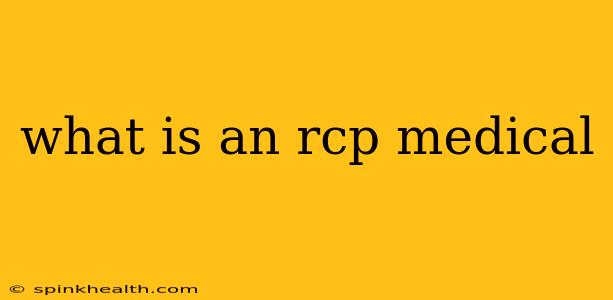What is an RCP Medical? Unraveling the Mystery of Respiratory Care Practitioners
The term "RCP medical" isn't a standard medical abbreviation or term used widely in the medical field. It's likely a misinterpretation or a less common variation of a more established title. The most probable meaning refers to a Respiratory Care Practitioner (RCP). Let's delve into what an RCP actually is and address some common questions surrounding this vital healthcare profession.
This isn't just a job; it's a calling to help people breathe easier. Imagine a world where every gasp for air is a struggle. That's the reality many patients face, and RCPs are on the front lines, fighting for their patients' ability to breathe.
What exactly does a Respiratory Care Practitioner (RCP) do?
RCPs are highly trained healthcare professionals specializing in the diagnosis, treatment, and management of patients with cardiopulmonary diseases. Their expertise covers a wide range of conditions, from asthma and pneumonia to cystic fibrosis and chronic obstructive pulmonary disease (COPD).
Think of them as the respiratory detectives, meticulously analyzing patient conditions, assessing breathing patterns, and devising personalized treatment plans. Their work isn't limited to hospitals; they can be found in various settings, including:
- Hospitals: Providing critical care to patients in intensive care units (ICUs), emergency rooms, and general hospital wards.
- Rehabilitation centers: Helping patients regain respiratory function after illness or injury.
- Home healthcare: Supporting patients with long-term respiratory conditions in their homes.
- Clinics: Conducting diagnostic tests and providing ongoing respiratory care.
Their daily tasks can vary widely but may include:
- Administering respiratory treatments: This includes medication delivery via nebulizers, inhalers, and other devices.
- Monitoring vital signs: Closely tracking heart rate, blood pressure, and oxygen saturation levels.
- Performing diagnostic tests: Such as pulmonary function tests (PFTs) and arterial blood gas (ABG) analysis.
- Operating and maintaining respiratory equipment: From ventilators to oxygen concentrators, ensuring proper function and patient safety.
- Educating patients and families: Providing crucial information about managing respiratory conditions and using respiratory equipment.
What qualifications do RCPs need?
Becoming an RCP requires dedication and rigorous training. Aspiring RCPs typically need:
- Associate's or Bachelor's degree: In respiratory care from an accredited program. This curriculum involves extensive classroom study, hands-on clinical experience, and rigorous examinations.
- National certification/licensure: This ensures a consistent standard of competency and professionalism across the profession. The specific requirements vary by location.
What is the difference between an RCP and a respiratory therapist?
The terms "Respiratory Care Practitioner" and "Respiratory Therapist" are often used interchangeably, and in many areas, they are essentially the same profession. There might be slight differences in terminology or specific job titles depending on the location or healthcare setting.
What is the job outlook for RCPs?
The demand for skilled RCPs is robust and shows no sign of slowing down. The aging population, increasing prevalence of chronic respiratory diseases, and advancements in respiratory technology all contribute to the continued need for these vital healthcare professionals.
Where can I find more information about becoming an RCP?
To learn more about educational pathways, certification requirements, and career opportunities, you can search online for accredited respiratory care programs in your area or explore professional organizations like the American Association for Respiratory Care (AARC).
This journey into the world of Respiratory Care Practitioners hopefully clarifies any confusion surrounding "RCP medical." It’s a field filled with purpose, dedication, and the profound satisfaction of helping others breathe a little easier. Their vital role in healthcare deserves recognition and understanding.

